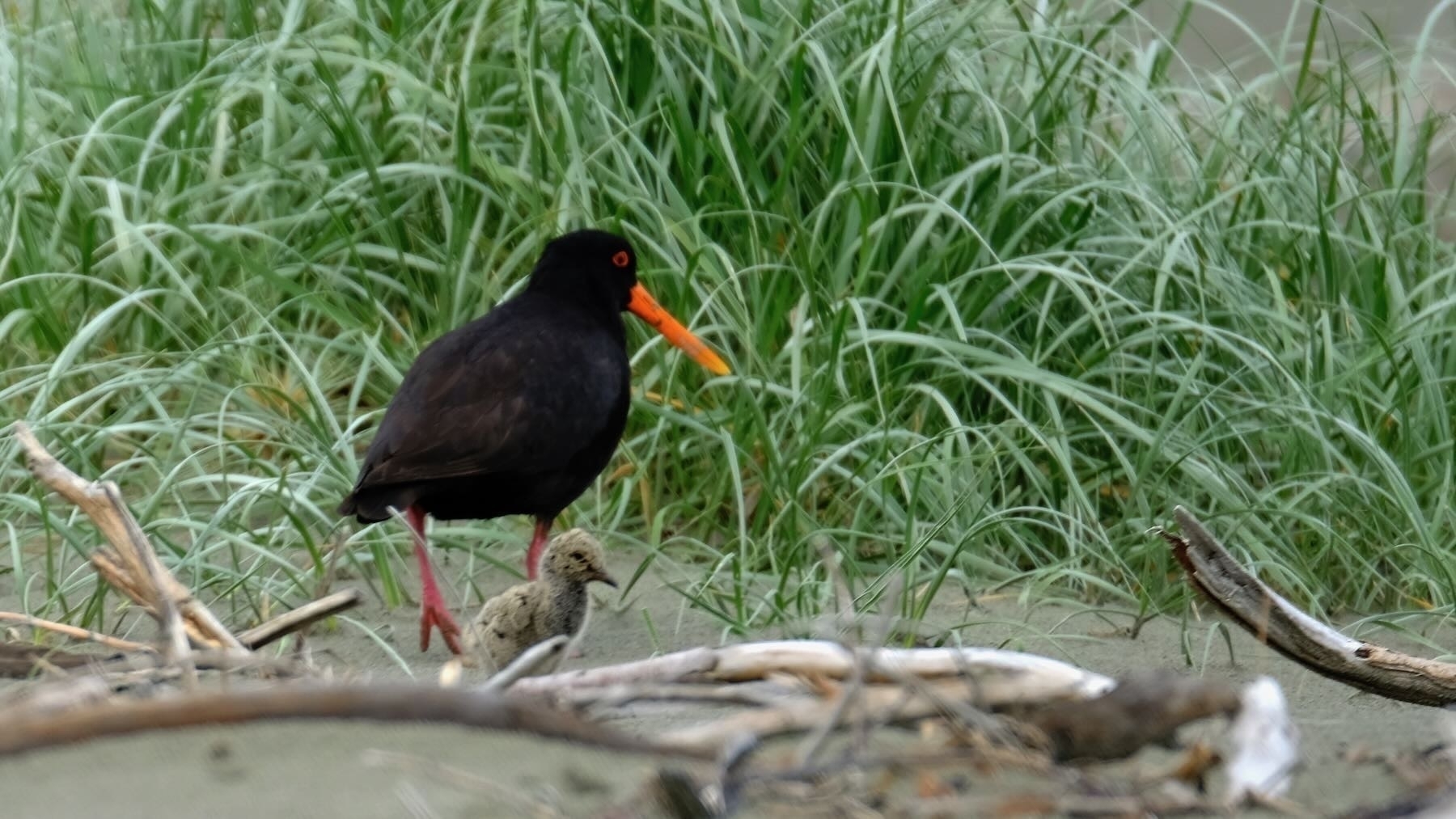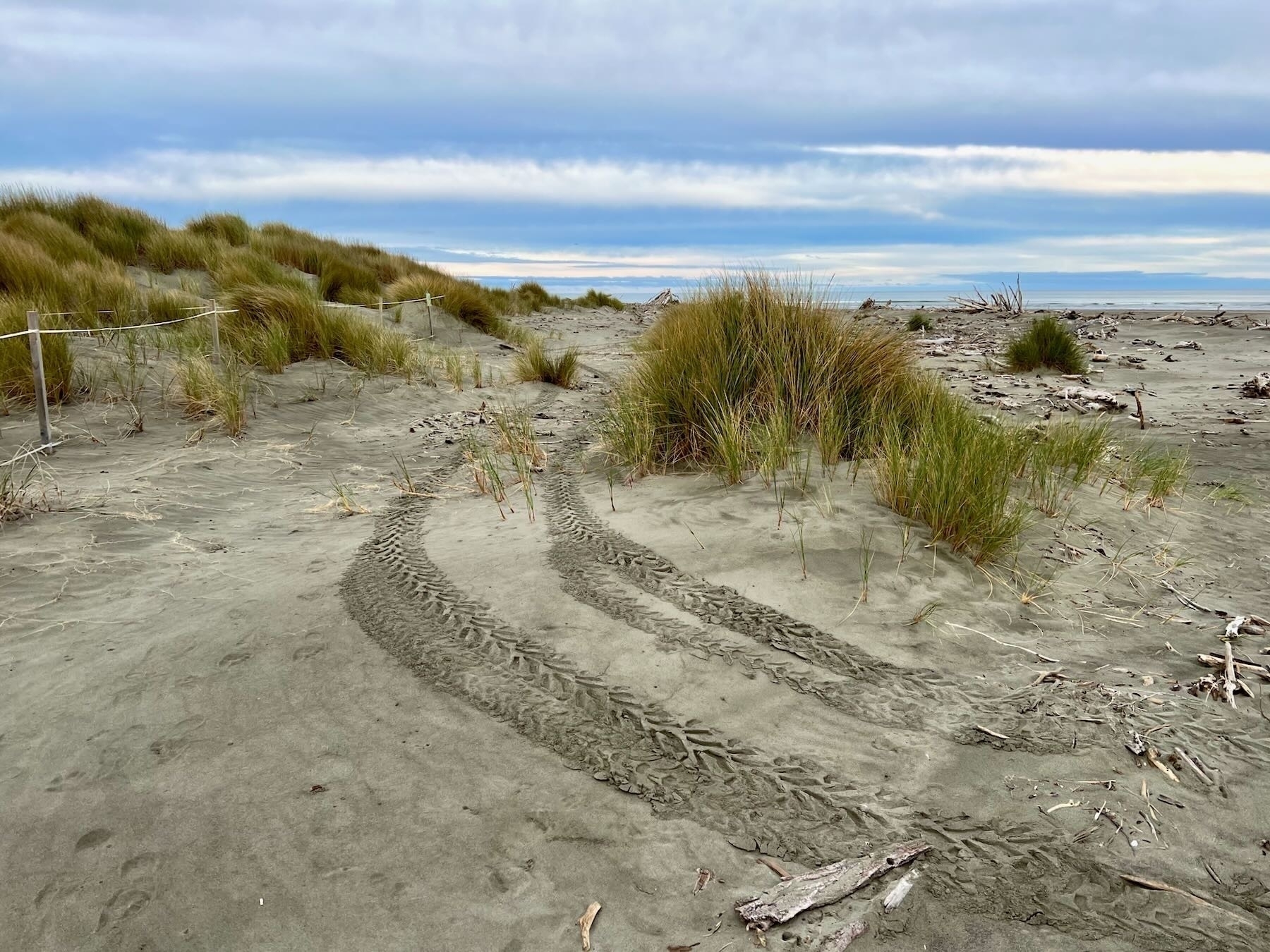
These news articles below have recently come to my attention. Three of them were published in the last few weeks.
We may have had a problem here at Waikawa Beach when in January 2023 two lads in a dune buggy type vehicle were harassing a Pied Stilt and its chicks. The boys apologised and promised not to do it again, but the Stilts disappeared soon after.

One local reported to me privately a few days ago that:
I was walking on the beach about 830pm the other night and saw an oyster catcher scurrying about with their chick on a strip of sand between the dunes and the wet sand by the sea. Then I saw three 4 wheel drives, at least 2 with trailers, heading towards them. They travelled past on both sides of the sand strip and if the birds survived (I think they did) it was pure luck.
Here are those articles. They make for interesting reading. Vehicles are just not really compatible with humans, birds and animals on beaches.
Beach goers forced to share with hoons and eco-vandals, Jan 23 2023
Beach goers forced to share with hoons and eco-vandals | Stuff.co.nz
TLDR: Local authorities around the country are frustrated with drivers flouting rules on beaches, endangering people and wildlife. Tensions between the [lifeguard] flags at Foxton Beach appear to be easing with the introduction of new signs and cones, and a swell of public support for restricted car access during lifeguard patrol hours.
Flouting of rules leads to restricted access for small Te Horo Beach carpark, 11 Jan, 2023
Flouting of rules leads to restricted access for small Te Horo Beach carpark
TLDR: Five jumbo concrete blocks prevent vehicles from accessing a small public carpark at Te Horo Beach… the blocks were placed after the “repeated failure” of people to observe the rules prohibiting vehicles on the beach, especially around the ecologically sensitive Mangaone Stream mouth, which the carpark is adjacent to. There are endangered dotterels in the area.
Plea for tourists to stop driving onto Manawatū beach, Jan 19 2022
Plea for tourists to stop driving onto Manawatū beach after 42 cars towed in one day | Stuff.co.nz
TLDR: Visitors swarmed to Himatangi Beach on New Year’s Day, but many got stuck, blocking access and frustrating community members. Russell Neal, a volunteer for Himatangi Beach Community Patrol, towed 42 cars from the beach on January 1.
Nests abandoned after quad bikers rip up protected beach, Jan 13 2022
Nests abandoned after quad bikers rip up protected beach
TLDR: Locals have been left aghast after quad bike riders did donuts and jumps on a protected Golden Bay beach, causing native birds to abandon their nests. Four pairs of variable oystercatchers – a threatened species – had been nesting in Onahau Sandspit…. After Friday’s disturbance, they have since abandoned their nests.
Sealife Suffers as Motorists Hit the Beach, Jan 18, 2023
Black Sand Highway: Sealife Suffers as Motorists Hit the Beach
TLDR: Kororā (little blue penguin), toheroa (beach clams) and the seldom-seen Muriwai gecko are all put in danger by ongoing use of vehicles down [Muriwai] beach. Then there’s the nesting sites for shorebirds like taranui (Caspian terns), tara (white-fronted terns) and tōrea (variable oyster catchers). Busy days can see over 1400 vehicles on the beach over the course of 24 hours. Off-road vehicles can rip up plants along shorelines and estuaries which provide habitat for protected species, while the noise and vibration of cars, trucks and bikes can send the birdlife packing.
Below added: 26 January 2023
Call to ban cars on popular family beaches, 24 January 2023
Call to ban cars on popular family beaches | Newshub
TLDR: Beachgoers are calling for better regulation of vehicles being driven on beaches, and in some cases banning them from popular family spots. Many drivers have a legitimate reason to travel along a beach, to access remote fishing or camping spots for example. But many are accused of just hooning along the sand and beachgoers have had enough. [At Peka Peka Beach] “The families and fishermen are great but the people coming here in their 4-wheel drives and bikes are not coming to see the beauty of the area, they are just coming to race and tear up the beach. It affects the environment, we have dotterels nesting, it is affecting the families with the children.”
Calls for cars to be banned on all beaches to protect vulnerable wildlife, 10/11/2022
Calls for cars to be banned on all beaches to protect vulnerable wildlife | Newshub
TLDR: Among the imprints of thick, four-wheel drive tyre treads at Muriwai Beach on Auckland’s west coast, a banded dotterel is picking its way across the sand just as a ute hits the beach only metres away. The little dotterel camouflaged against the sand has escaped the big wheels on this quiet weekday morning but at weekends, it has hundreds of vehicles to contend with. Even if you don’t directly strike a bird or strike a nest, the noise and vibrations that these vehicles cause can be enough to scare birds out of their nests. For example, the yellow eyed penguin, it will come into shore with food and if a bunch of vehicles are driving backwards and forwards it will start to digest the food it is meant to be saving for its young back in the nest, which can cause huge problems, and starvation of the chicks."
Should cars be banned on beaches to protect native species?, 26 January 2023
Nine To Noon, Should cars be banned on beaches to protect native species? — Download audio:
Forest and Bird wants Auckland’s Muriwai Beach to close to vehicles to protect precious native species and fragile ecosystems. The organisation would also like to see the Land Transport Act’s definition of a road be amended, so that beaches are longer designated as roads. Muriwai is one of two Auckland beaches where driving is allowed, but Forest and Bird says vehicles are causing harm to some of the country’s most vulnerable and at-risk species and damaging delicate sand dunes. The beach is home to species such as kororā / little blue penguins, fur seals, and the Muriwai gecko, and is a nesting site for shorebirds like Caspian terns, white-fronted terns and variable oyster catchers. Last year, data from January to November shows more than 54,000 vehicles were recorded driving along Muriwai Beach - but Forest and Bird says that only measures vehicles at one of the beach’s entry points and the number could be much higher. Kathryn speaks with Forest & Bird’s Auckland regional conservation manager Carl Morgan.
New signs to deter hoons on dunes, November 2022
TLDR: Signs at strategic tracks leading to Kāpiti beaches are being erected in an effort to stop the ongoing problem of motorcyclists riding on the beaches, and particularly the sand dunes. The behaviour of some beach users has become a serious concern for council staff and elected members. Dotterel nests are under threat.
A safer highway and protection for the beach, January 2023
TLDR: Just before the holiday season, council restricted beach access at the end of Te Horo Beach Road. This was in response to failing to prevent vehicles from driving south in front of the houses, and north across the Mangaone Stream. Rubbish has also been dumped. On December 27 a Mitsubishi 4WD ute drove across Mangaone Stream and down the main Te Horo Beach, weaving in and out of the families enjoying the beachside. This was followed by vandalism of signage.